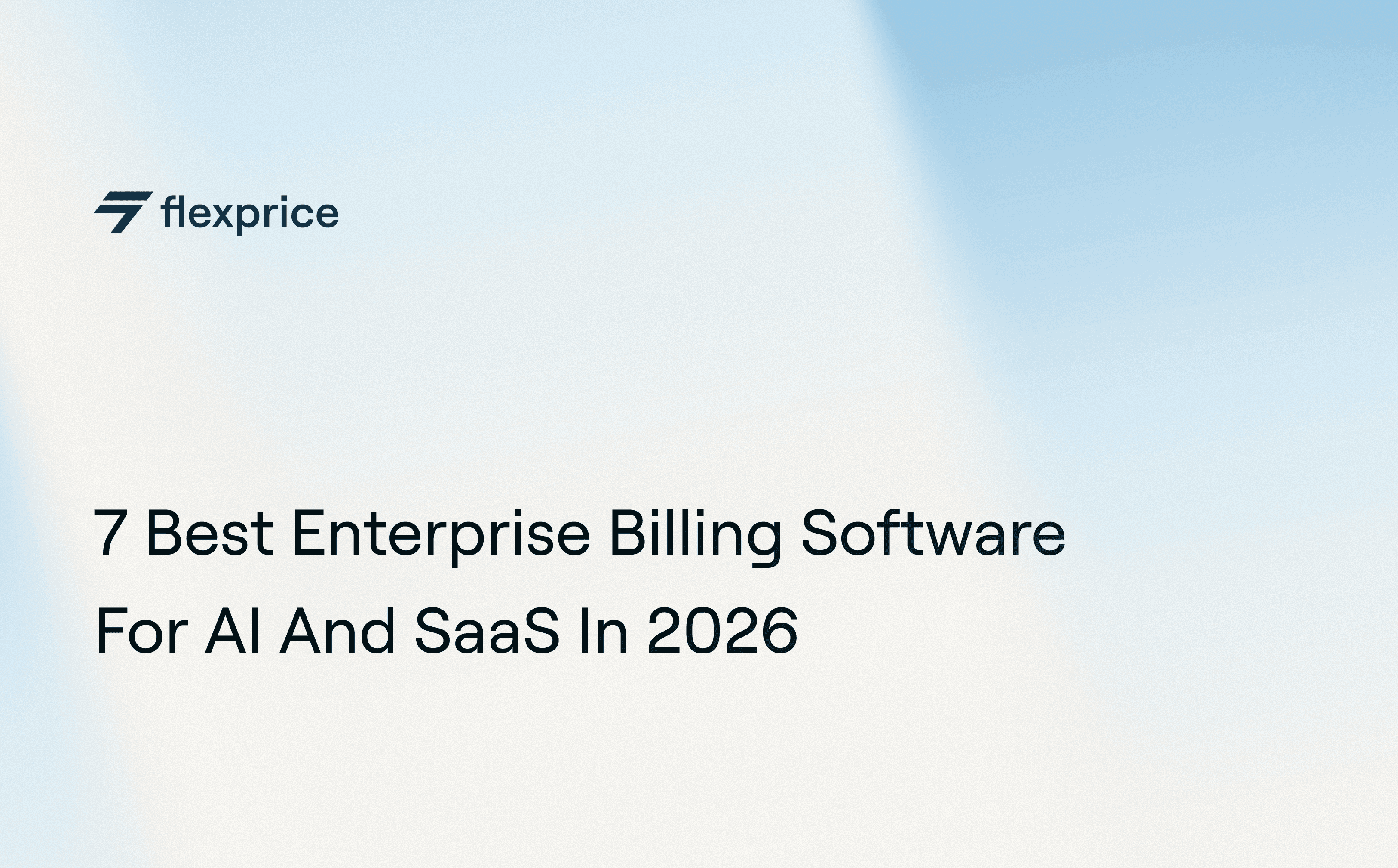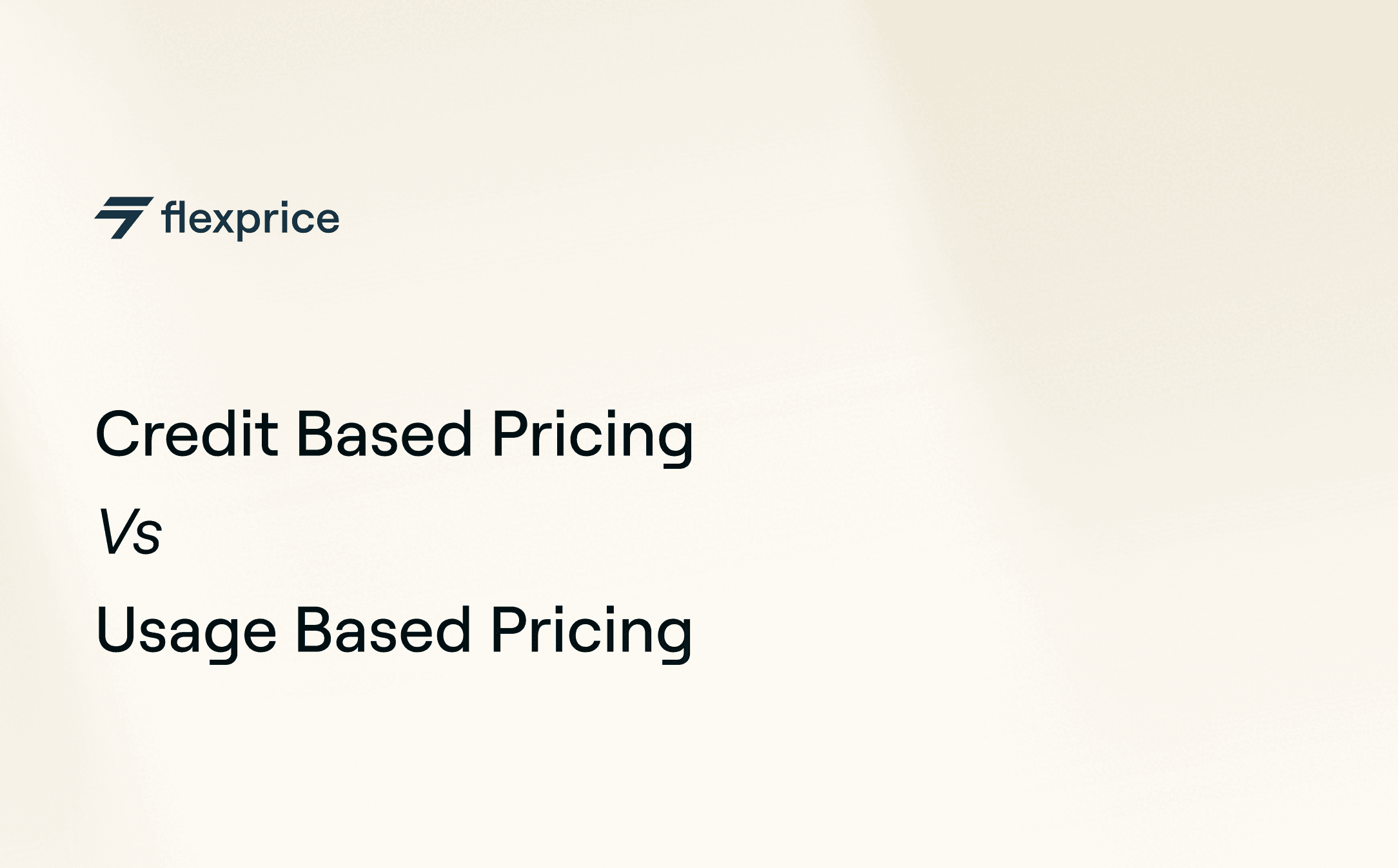 Bhavyasri Guruvu
Bhavyasri GuruvuWhat is the Most Flexible Billing System for Startups?
What is the Most Flexible Billing System for Startups?
What is the Most Flexible Billing System for Startups?
What is the Most Flexible Billing System for Startups?
Nov 17, 2025
Nov 17, 2025
Nov 17, 2025
• 10 mins read
• 10 mins read


Bhavyasri Guruvu
Content Writing Intern. Flexprice





If you are a startup founder, chances are that you have been thinking about your billing system very much and you are not alone! Many founders first search for “most flexible billing system” and we totally get it. Pricing models change faster than your billing system can keep up or simply your product outgrew simple subscription systems.
Without a flexible billing engine, you will spend more time adapting to your billing tools while your focus should be catering to your customers.
What you really need is a billing system that moves at your pace; where you can experiment with your pricing and scale confidently unlike traditional billing systems where you don’t have much control over your own billing logic.
In this blog, you will explore the top 10 flexible billing platforms and learn exactly what to evaluate before selecting the right solution for your startup!
Note: Even though this post is published on Flexprice, it’s not a biased roundup. We’ve evaluated every tool on its technical merit, flexibility, and developer experience exactly how we’d expect anyone building serious AI infrastructure to do.
TL;DR
Startups need flexible billing because pricing evolves quickly, and rigid systems slow experimentation and create engineering bottlenecks.
A flexible billing platform should support multiple pricing models, real-time usage visibility, scalability, integrations, and openness.
Flexprice: Open-source, usage-first billing built for AI workloads, real-time metering, and fast pricing iteration.
Zuora: Enterprise-grade billing and revenue automation for companies with complex global operations.
Kill Bill: Open-source, modular billing platform for teams that want full control and deep customization.
Recurly: Subscription-focused billing with strong dunning and retention tools for traditional SaaS.
Hyperswitch: Developer-centric payments and billing engine for fully customizable payment flows.
Unibee: Simple, fast subscription billing for early-stage SaaS companies needing quick setup.
m3ter: Granular metering and usage event processing for API-heavy and consumption-based products.
Zenskar: Automated usage and hybrid billing with strong revenue operations and contract flexibility.
Billabear: Open-source recurring billing and invoicing platform with full data ownership and extensibility.
OpenMeter: Open-source metering system for real-time collection, aggregation, and querying of usage events.
Flexprice stands out because it offers open-source control, usage-first architecture, AI-native metering, extensibility, and zero vendor lock-in.
It scales with your product across usage, geography, and complexity without requiring you to rebuild your billing stack.
Top 10 Flexible Billing Platforms for Startups
Flexprice
Startups often need to iterate quickly on pricing models to match the market and customer needs. Traditional billing systems can be rigid, slow to update, and have you vendor-locked, which are obstacles for experimentation and responsiveness.
Flexprice is an open-source metering and billing platform built for AI and SaaS companies that is developer-friendly, giving you the freedom to rapidly test and deploy new pricing tiers and bundles, all while having full control over your billing logic and zero vendor lock-ins. It lets you define your pricing logic as code, meter complex usage (like API calls, inference minutes, or GPU time), and link it directly to invoicing and entitlements.
With Flexprice, you can customize entitlements and access controls for your customers based on their usage, credits, or subscription status.
Key Features
Usage-Based Billing: Flexprice supports granular metering of usage like API requests, AI inferences and GPU seconds so that you can bill customers based on their actual consumption.
Credit-Based Billing: You can issue free trial units or promotional credits and manage expiry, rollover, and top-ups, providing flexibility for getting customers onboard and making them stay.
Hybrid Models: It enables hybrid pricing models, Subscriptions, usage-based, credit-based, or combinations of these allowing you to tailor pricing to different customer segments.
Real-Time Metering: Flexprice provides real-time usage tracking , ensuring accurate billing for your AI workloads and API products.
Extensibility & Fast Pricing Iteration: As it is an open-source platform, it allows you to extend and customize your pricing logic, metering rules, entitlements, and invoicing to fit your business needs. You can iterate your pricing models very quickly and efficiently.
Integration: You just need to bring your existing systems and Flexprice's billing stack can be easily integrated without any engineering hassle. It is developer-friendly and makes it easy for developers to build, test and deploy new billing features easily.
Scalability: The system is designed to scale with your product, supporting high-volume transactions and real-time analytics.
Compliance: You can ensure compliance with local tax, invoicing, and regulatory requirements by customizing your workflows.
Get started with your billing today.
Get started with your billing today.
Zuora
Zuora is built for companies that are looking at scaling fast and need to handle complex billing workflows. You can automate recurring billing, track usage, and manage paywalls. Its architecture supports simple subscriptions as well as usage-based models, making it a good option for startups aiming for enterprise-level growth.
Key Features:
Recurring & Usage-Based Billing: You can automate recurring billing and track usage data for flexible pricing models.
Dynamic Paywalls: It enables you to launch paywalls that adapt to customer needs and usage patterns.
Revenue Automation: It supports automation of revenue recognition and compliance workflows, reducing manual effort.
Global Operations: Your startup will have the flexibility to scale across markets with support for multi-entity and multi-currency billing.
Integration Ecosystem: It supports a flexible system where you can connect with payment gateways, CRM, and analytics tools seamlessly.
Kill Bill
Kill Bill is an open-source billing and payment platform trusted by companies operating at different scales. It’s designed for teams that want strong control over their data and billing logic, and customize their entire system based on their business models. Its architecture is modular along with its plugin ecosystem making it a favorite for engineering-heavy startups.
Key Features:
Open-Source & Modular: You can deploy, customize, and extend Kill Bill to fit your business needs.
Subscription & Usage-Based Billing: It provides support for recurring subscriptions, usage-based billing, and custom pricing models.
Headless Payment Integrations: It gives you the flexibility to integrate with major payment gateways like Stripe, PayPal, and Adyen, plus alternative payment methods.
Control Over Data: Avoid vendor lock-in and maintain full ownership of your billing data.
Customizable Plugins: You can build isolated plugins to interact with Kill Bill, enabling deep customization and automation.
Recurly
Recurly is a subscription billing platform that’s best for startups running traditional SaaS products. It is easy to use and has strong dunning tools, retention features, making it a good choice for teams that want to optimize recurring revenue without heavy technical overhead.
Key Features:
Subscription Management: It is easy to setup for recurring billing and multiple billing logics.
Dunning & Retention: It provides advanced tools for managing failed payments and reducing churn.
Automated Renewals: You can streamline renewals and upgrades for better customer experience.
Flexible Integrations: It lets you connect with payment processors and analytics tools for smooth billing workflows.
Hyperswitch
Hyperswitch is a developer centric payments and billing system that’s ideal for startups that want to build custom workflows. It supports multiple payment processors and seamless integration, making it a great fit for teams that are looking for customized checkout and billing experiences.
Key Features:
Custom Payment Routing: You can build your own payment flows with support for multiple processors.
Unified Payment Interface: It is easy to integrate with multiple payment gateways and methods.
Developer-Friendly APIs: It supports flexible APIs for building and customizing payment logic.
Unibee
Unibee is a good billing option for early stage SaaS companies that are looking to get up and get going fast. It offers quick setup, easy plan management, and basic customization, making it a hassle-free choice for teams focused on growth.
Key Features:
Quick Setup: It supports fast onboarding for recurring billing and subscription management.
Plan Flexibility: You can easily configure for multiple subscription plans and pricing tiers.
Affordable Pricing: This is a cost-effective option for startups that are not looking at much customization.
m3ter
m3ter is a usage metering and processing platform built for companies with usage-based or API-heavy products. It captures usage data on a granular level, processes events, and enables accurate billing, making it ideal for teams that need in depth, event-based billing.
Key Features:
Granular Usage Metering: It supports capturing and processing detailed usage events for accurate billing.
Real-Time Event Pipelines: It provides real-time data pipelines for usage-based products.
Custom Pricing Flows: You can tailor your usage-based billing logic for simple as well as complex SaaS features.
Zenskar
Zenskar is a revenue automation platform that supports usage-based, hybrid, and custom billing.
Key Features:
Usage & Hybrid Pricing: It supports usage-based, hybrid, and custom contract billing.
Revenue Automation: You can automate your billing, invoicing, and reporting.
Contract Customization: It gets easier to handle nuanced billing terms and bundled offerings seamlessly.
Billabear
Billabear is an open-source subscription billing tool that is suitable for companies that want flexibility and control over their billing stack. It can be self-hosted and its modular architecture makes it a great choice for teams that want to extend their billing workflows and own their data.
Key Features:
Open Source & Self-Hosted: You get to have full control over your billing logic and data.
Recurring Billing & Invoicing: It supports recurring billing and flexible invoicing.
Extensible Architecture: It provides modular extension for your recurring revenue workflows.
. OpenMeter
OpenMeter is an open-source metering platform for collecting, aggregating, and billing usage events in real time. It is designed for companies that need granular usage tracking, making it a good complement to any billing system.
Key Features:
Open Source Metering: You can collect, aggregate, and bill usage events in real time.
Real-Time Data Pipelines: It provides real-time data pipelines for efficient billing.
Extensible & Scalable: It is designed for high-volume, real-time usage data needs and scales with your business.
What Startups Should Look for in a Flexible Billing Platform
Support for Multiple Pricing Models
You should not be planning your business around your billing tools, it should be the other way around. Your billing stack should support these:
Recurring subscriptions: You set the billing and your customers pay on schedule every billing cycle so that you can focus on growing your product, not chasing payments.
Hybrid models combining usage and recurring charges: Mix fixed subscriptions with pay-as-you-go usage, so customers only pay extra for what they actually use.
Prepaid credits: Letting customers buy credits upfront and use them as needed, perfect for trials, promotions, or flexible spending.
Volume or tier based usage: The more customers use, the less they pay per unit, encouraging bigger commitments and rewarding loyalty.
Event driven usage collections across multiple sources: Track every action, API call, or event in real time, no matter where it happens, for accurate and dynamic billing.
Ability to Launch Pricing Changes Quickly
Your system should be flexible enough to launch pricing changes quickly without much engineering interventions.
Founders on Reddit frequently point out that billing is the reason they delay pricing experiments. This implies that flexible billing modules are very important so that you don't compromise on your pricing logic.
Real-Time Visibility Into Usage and Revenue
Modern SaaS and AI products need real-time data loops, giving visibility into usage spikes, credit balances and cost anomalies that require your immediate action to avoid revenue loss or unnecessary infrastructure costs.
Scalability for Future Pricing Complexity
Billing works fine until you hit real usage. Your billing system should be able to scale with your product supporting onboarding of more customers, features, pricing tweaks and high-volumes of events.
Integration with Existing Infrastructure
Billing does not operate in isolation. A flexible platform integrates with your CRM, ERP and your data pipelines. It should support your product usage, financial operations, invoicing and reporting tools connect seamlessly.
Extensibility and Openness
Having open architectures help you set up your billing stack by yourself without much engineering providing long-term flexibility.
Community comments across Quora and developer forums repeatedly highlight the advantages of systems that can be inspected, modified, and extended without depending on proprietary constraints.
How Flexprice Delivers Flexibility and Scalability
Built for Usage Heavy Startups and AI Native Products
Flexprice is built for companies that are usage-heavy and want to move fast, especially those working with AI, APIs, or any product where usage patterns are unpredictable. Whether you’re starting with simple plans or planning to roll out complex hybrid models, Flexprice lets you evolve your pricing without having to rebuild your billing stack from scratch.
The platform supports usage-based pricing, credit systems, event-driven metering, and custom pricing flows, all in one unified system. That means you can start small and scale up as your business grows, adding new features and models without any major engineering lift.
Open-Source Architecture for Full Control
It is open source, so you get full control and transparency over your pricing logic, metering pipelines, entitlements and invoicing. You can self-host or go with a managed deployment, but either way, you keep ownership of your data and logic without vendor lock-ins.
Real-Time Metering Pipeline Designed for Scale
Real-time metering pipeline helps you scale, handling high volumes of events with ease. Whether you’re tracking AI inferences, GPU usage, or API calls, Flexprice keeps up, making it perfect for modern, usage-driven products.
Pricing Iteration Without Engineering Friction
Pricing iteration is a breeze with Flexprice. Product, finance, and revenue teams can launch new pricing experiments, introduce credits, or add new features with minimal developer involvement. This means faster experimentation, lower costs, and more agility when it comes to pricing.
Scales with the Company Across Usage, Geography, and Complexity
Flexprice grows with the business. Whether the team introduces new plans, adds enterprise workflows, expands across multiple regions, or requires advanced contract logic, the core system can adapt without disruption.
Frequently Asked Questions (FAQs)
Why do startups need a flexible billing platform?
Startups change fast;new features, new customer segments, and new pricing ideas emerge constantly. A flexible billing platform lets them experiment without breaking workflows, supports multiple pricing models, adapts to unpredictable usage patterns, and avoids engineering bottlenecks. Without flexibility, billing becomes a blocker instead of an enabler.
What is the most important challenge startups face before choosing the right billing tool?
Most startups struggle because their needs evolve faster than the billing tools they try. They often begin with simple subscriptions, then suddenly require usage metering, credits, hybrid pricing, or custom workflows. The biggest challenge is finding a system that can support today’s needs and adapt as the product grows without forcing rebuilds, vendor lock-ins, or heavy engineering effort.
Zuora
Zuora is built for companies that are looking at scaling fast and need to handle complex billing workflows. You can automate recurring billing, track usage, and manage paywalls. Its architecture supports simple subscriptions as well as usage-based models, making it a good option for startups aiming for enterprise-level growth.
Key Features:
Recurring & Usage-Based Billing: You can automate recurring billing and track usage data for flexible pricing models.
Dynamic Paywalls: It enables you to launch paywalls that adapt to customer needs and usage patterns.
Revenue Automation: It supports automation of revenue recognition and compliance workflows, reducing manual effort.
Global Operations: Your startup will have the flexibility to scale across markets with support for multi-entity and multi-currency billing.
Integration Ecosystem: It supports a flexible system where you can connect with payment gateways, CRM, and analytics tools seamlessly.
Kill Bill
Kill Bill is an open-source billing and payment platform trusted by companies operating at different scales. It’s designed for teams that want strong control over their data and billing logic, and customize their entire system based on their business models. Its architecture is modular along with its plugin ecosystem making it a favorite for engineering-heavy startups.
Key Features:
Open-Source & Modular: You can deploy, customize, and extend Kill Bill to fit your business needs.
Subscription & Usage-Based Billing: It provides support for recurring subscriptions, usage-based billing, and custom pricing models.
Headless Payment Integrations: It gives you the flexibility to integrate with major payment gateways like Stripe, PayPal, and Adyen, plus alternative payment methods.
Control Over Data: Avoid vendor lock-in and maintain full ownership of your billing data.
Customizable Plugins: You can build isolated plugins to interact with Kill Bill, enabling deep customization and automation.
Recurly
Recurly is a subscription billing platform that’s best for startups running traditional SaaS products. It is easy to use and has strong dunning tools, retention features, making it a good choice for teams that want to optimize recurring revenue without heavy technical overhead.
Key Features:
Subscription Management: It is easy to setup for recurring billing and multiple billing logics.
Dunning & Retention: It provides advanced tools for managing failed payments and reducing churn.
Automated Renewals: You can streamline renewals and upgrades for better customer experience.
Flexible Integrations: It lets you connect with payment processors and analytics tools for smooth billing workflows.
Hyperswitch
Hyperswitch is a developer centric payments and billing system that’s ideal for startups that want to build custom workflows. It supports multiple payment processors and seamless integration, making it a great fit for teams that are looking for customized checkout and billing experiences.
Key Features:
Custom Payment Routing: You can build your own payment flows with support for multiple processors.
Unified Payment Interface: It is easy to integrate with multiple payment gateways and methods.
Developer-Friendly APIs: It supports flexible APIs for building and customizing payment logic.
Unibee
Unibee is a good billing option for early stage SaaS companies that are looking to get up and get going fast. It offers quick setup, easy plan management, and basic customization, making it a hassle-free choice for teams focused on growth.
Key Features:
Quick Setup: It supports fast onboarding for recurring billing and subscription management.
Plan Flexibility: You can easily configure for multiple subscription plans and pricing tiers.
Affordable Pricing: This is a cost-effective option for startups that are not looking at much customization.
m3ter
m3ter is a usage metering and processing platform built for companies with usage-based or API-heavy products. It captures usage data on a granular level, processes events, and enables accurate billing, making it ideal for teams that need in depth, event-based billing.
Key Features:
Granular Usage Metering: It supports capturing and processing detailed usage events for accurate billing.
Real-Time Event Pipelines: It provides real-time data pipelines for usage-based products.
Custom Pricing Flows: You can tailor your usage-based billing logic for simple as well as complex SaaS features.
Zenskar
Zenskar is a revenue automation platform that supports usage-based, hybrid, and custom billing.
Key Features:
Usage & Hybrid Pricing: It supports usage-based, hybrid, and custom contract billing.
Revenue Automation: You can automate your billing, invoicing, and reporting.
Contract Customization: It gets easier to handle nuanced billing terms and bundled offerings seamlessly.
Billabear
Billabear is an open-source subscription billing tool that is suitable for companies that want flexibility and control over their billing stack. It can be self-hosted and its modular architecture makes it a great choice for teams that want to extend their billing workflows and own their data.
Key Features:
Open Source & Self-Hosted: You get to have full control over your billing logic and data.
Recurring Billing & Invoicing: It supports recurring billing and flexible invoicing.
Extensible Architecture: It provides modular extension for your recurring revenue workflows.
. OpenMeter
OpenMeter is an open-source metering platform for collecting, aggregating, and billing usage events in real time. It is designed for companies that need granular usage tracking, making it a good complement to any billing system.
Key Features:
Open Source Metering: You can collect, aggregate, and bill usage events in real time.
Real-Time Data Pipelines: It provides real-time data pipelines for efficient billing.
Extensible & Scalable: It is designed for high-volume, real-time usage data needs and scales with your business.
What Startups Should Look for in a Flexible Billing Platform
Support for Multiple Pricing Models
You should not be planning your business around your billing tools, it should be the other way around. Your billing stack should support these:
Recurring subscriptions: You set the billing and your customers pay on schedule every billing cycle so that you can focus on growing your product, not chasing payments.
Hybrid models combining usage and recurring charges: Mix fixed subscriptions with pay-as-you-go usage, so customers only pay extra for what they actually use.
Prepaid credits: Letting customers buy credits upfront and use them as needed, perfect for trials, promotions, or flexible spending.
Volume or tier based usage: The more customers use, the less they pay per unit, encouraging bigger commitments and rewarding loyalty.
Event driven usage collections across multiple sources: Track every action, API call, or event in real time, no matter where it happens, for accurate and dynamic billing.
Ability to Launch Pricing Changes Quickly
Your system should be flexible enough to launch pricing changes quickly without much engineering interventions.
Founders on Reddit frequently point out that billing is the reason they delay pricing experiments. This implies that flexible billing modules are very important so that you don't compromise on your pricing logic.
Real-Time Visibility Into Usage and Revenue
Modern SaaS and AI products need real-time data loops, giving visibility into usage spikes, credit balances and cost anomalies that require your immediate action to avoid revenue loss or unnecessary infrastructure costs.
Scalability for Future Pricing Complexity
Billing works fine until you hit real usage. Your billing system should be able to scale with your product supporting onboarding of more customers, features, pricing tweaks and high-volumes of events.
Integration with Existing Infrastructure
Billing does not operate in isolation. A flexible platform integrates with your CRM, ERP and your data pipelines. It should support your product usage, financial operations, invoicing and reporting tools connect seamlessly.
Extensibility and Openness
Having open architectures help you set up your billing stack by yourself without much engineering providing long-term flexibility.
Community comments across Quora and developer forums repeatedly highlight the advantages of systems that can be inspected, modified, and extended without depending on proprietary constraints.
How Flexprice Delivers Flexibility and Scalability
Built for Usage Heavy Startups and AI Native Products
Flexprice is built for companies that are usage-heavy and want to move fast, especially those working with AI, APIs, or any product where usage patterns are unpredictable. Whether you’re starting with simple plans or planning to roll out complex hybrid models, Flexprice lets you evolve your pricing without having to rebuild your billing stack from scratch.
The platform supports usage-based pricing, credit systems, event-driven metering, and custom pricing flows, all in one unified system. That means you can start small and scale up as your business grows, adding new features and models without any major engineering lift.
Open-Source Architecture for Full Control
It is open source, so you get full control and transparency over your pricing logic, metering pipelines, entitlements and invoicing. You can self-host or go with a managed deployment, but either way, you keep ownership of your data and logic without vendor lock-ins.
Real-Time Metering Pipeline Designed for Scale
Real-time metering pipeline helps you scale, handling high volumes of events with ease. Whether you’re tracking AI inferences, GPU usage, or API calls, Flexprice keeps up, making it perfect for modern, usage-driven products.
Pricing Iteration Without Engineering Friction
Pricing iteration is a breeze with Flexprice. Product, finance, and revenue teams can launch new pricing experiments, introduce credits, or add new features with minimal developer involvement. This means faster experimentation, lower costs, and more agility when it comes to pricing.
Scales with the Company Across Usage, Geography, and Complexity
Flexprice grows with the business. Whether the team introduces new plans, adds enterprise workflows, expands across multiple regions, or requires advanced contract logic, the core system can adapt without disruption.
Frequently Asked Questions (FAQs)
Why do startups need a flexible billing platform?
Startups change fast;new features, new customer segments, and new pricing ideas emerge constantly. A flexible billing platform lets them experiment without breaking workflows, supports multiple pricing models, adapts to unpredictable usage patterns, and avoids engineering bottlenecks. Without flexibility, billing becomes a blocker instead of an enabler.
What is the most important challenge startups face before choosing the right billing tool?
Most startups struggle because their needs evolve faster than the billing tools they try. They often begin with simple subscriptions, then suddenly require usage metering, credits, hybrid pricing, or custom workflows. The biggest challenge is finding a system that can support today’s needs and adapt as the product grows without forcing rebuilds, vendor lock-ins, or heavy engineering effort.
Zuora
Zuora is built for companies that are looking at scaling fast and need to handle complex billing workflows. You can automate recurring billing, track usage, and manage paywalls. Its architecture supports simple subscriptions as well as usage-based models, making it a good option for startups aiming for enterprise-level growth.
Key Features:
Recurring & Usage-Based Billing: You can automate recurring billing and track usage data for flexible pricing models.
Dynamic Paywalls: It enables you to launch paywalls that adapt to customer needs and usage patterns.
Revenue Automation: It supports automation of revenue recognition and compliance workflows, reducing manual effort.
Global Operations: Your startup will have the flexibility to scale across markets with support for multi-entity and multi-currency billing.
Integration Ecosystem: It supports a flexible system where you can connect with payment gateways, CRM, and analytics tools seamlessly.
Kill Bill
Kill Bill is an open-source billing and payment platform trusted by companies operating at different scales. It’s designed for teams that want strong control over their data and billing logic, and customize their entire system based on their business models. Its architecture is modular along with its plugin ecosystem making it a favorite for engineering-heavy startups.
Key Features:
Open-Source & Modular: You can deploy, customize, and extend Kill Bill to fit your business needs.
Subscription & Usage-Based Billing: It provides support for recurring subscriptions, usage-based billing, and custom pricing models.
Headless Payment Integrations: It gives you the flexibility to integrate with major payment gateways like Stripe, PayPal, and Adyen, plus alternative payment methods.
Control Over Data: Avoid vendor lock-in and maintain full ownership of your billing data.
Customizable Plugins: You can build isolated plugins to interact with Kill Bill, enabling deep customization and automation.
Recurly
Recurly is a subscription billing platform that’s best for startups running traditional SaaS products. It is easy to use and has strong dunning tools, retention features, making it a good choice for teams that want to optimize recurring revenue without heavy technical overhead.
Key Features:
Subscription Management: It is easy to setup for recurring billing and multiple billing logics.
Dunning & Retention: It provides advanced tools for managing failed payments and reducing churn.
Automated Renewals: You can streamline renewals and upgrades for better customer experience.
Flexible Integrations: It lets you connect with payment processors and analytics tools for smooth billing workflows.
Hyperswitch
Hyperswitch is a developer centric payments and billing system that’s ideal for startups that want to build custom workflows. It supports multiple payment processors and seamless integration, making it a great fit for teams that are looking for customized checkout and billing experiences.
Key Features:
Custom Payment Routing: You can build your own payment flows with support for multiple processors.
Unified Payment Interface: It is easy to integrate with multiple payment gateways and methods.
Developer-Friendly APIs: It supports flexible APIs for building and customizing payment logic.
Unibee
Unibee is a good billing option for early stage SaaS companies that are looking to get up and get going fast. It offers quick setup, easy plan management, and basic customization, making it a hassle-free choice for teams focused on growth.
Key Features:
Quick Setup: It supports fast onboarding for recurring billing and subscription management.
Plan Flexibility: You can easily configure for multiple subscription plans and pricing tiers.
Affordable Pricing: This is a cost-effective option for startups that are not looking at much customization.
m3ter
m3ter is a usage metering and processing platform built for companies with usage-based or API-heavy products. It captures usage data on a granular level, processes events, and enables accurate billing, making it ideal for teams that need in depth, event-based billing.
Key Features:
Granular Usage Metering: It supports capturing and processing detailed usage events for accurate billing.
Real-Time Event Pipelines: It provides real-time data pipelines for usage-based products.
Custom Pricing Flows: You can tailor your usage-based billing logic for simple as well as complex SaaS features.
Zenskar
Zenskar is a revenue automation platform that supports usage-based, hybrid, and custom billing.
Key Features:
Usage & Hybrid Pricing: It supports usage-based, hybrid, and custom contract billing.
Revenue Automation: You can automate your billing, invoicing, and reporting.
Contract Customization: It gets easier to handle nuanced billing terms and bundled offerings seamlessly.
Billabear
Billabear is an open-source subscription billing tool that is suitable for companies that want flexibility and control over their billing stack. It can be self-hosted and its modular architecture makes it a great choice for teams that want to extend their billing workflows and own their data.
Key Features:
Open Source & Self-Hosted: You get to have full control over your billing logic and data.
Recurring Billing & Invoicing: It supports recurring billing and flexible invoicing.
Extensible Architecture: It provides modular extension for your recurring revenue workflows.
. OpenMeter
OpenMeter is an open-source metering platform for collecting, aggregating, and billing usage events in real time. It is designed for companies that need granular usage tracking, making it a good complement to any billing system.
Key Features:
Open Source Metering: You can collect, aggregate, and bill usage events in real time.
Real-Time Data Pipelines: It provides real-time data pipelines for efficient billing.
Extensible & Scalable: It is designed for high-volume, real-time usage data needs and scales with your business.
What Startups Should Look for in a Flexible Billing Platform
Support for Multiple Pricing Models
You should not be planning your business around your billing tools, it should be the other way around. Your billing stack should support these:
Recurring subscriptions: You set the billing and your customers pay on schedule every billing cycle so that you can focus on growing your product, not chasing payments.
Hybrid models combining usage and recurring charges: Mix fixed subscriptions with pay-as-you-go usage, so customers only pay extra for what they actually use.
Prepaid credits: Letting customers buy credits upfront and use them as needed, perfect for trials, promotions, or flexible spending.
Volume or tier based usage: The more customers use, the less they pay per unit, encouraging bigger commitments and rewarding loyalty.
Event driven usage collections across multiple sources: Track every action, API call, or event in real time, no matter where it happens, for accurate and dynamic billing.
Ability to Launch Pricing Changes Quickly
Your system should be flexible enough to launch pricing changes quickly without much engineering interventions.
Founders on Reddit frequently point out that billing is the reason they delay pricing experiments. This implies that flexible billing modules are very important so that you don't compromise on your pricing logic.
Real-Time Visibility Into Usage and Revenue
Modern SaaS and AI products need real-time data loops, giving visibility into usage spikes, credit balances and cost anomalies that require your immediate action to avoid revenue loss or unnecessary infrastructure costs.
Scalability for Future Pricing Complexity
Billing works fine until you hit real usage. Your billing system should be able to scale with your product supporting onboarding of more customers, features, pricing tweaks and high-volumes of events.
Integration with Existing Infrastructure
Billing does not operate in isolation. A flexible platform integrates with your CRM, ERP and your data pipelines. It should support your product usage, financial operations, invoicing and reporting tools connect seamlessly.
Extensibility and Openness
Having open architectures help you set up your billing stack by yourself without much engineering providing long-term flexibility.
Community comments across Quora and developer forums repeatedly highlight the advantages of systems that can be inspected, modified, and extended without depending on proprietary constraints.
How Flexprice Delivers Flexibility and Scalability
Built for Usage Heavy Startups and AI Native Products
Flexprice is built for companies that are usage-heavy and want to move fast, especially those working with AI, APIs, or any product where usage patterns are unpredictable. Whether you’re starting with simple plans or planning to roll out complex hybrid models, Flexprice lets you evolve your pricing without having to rebuild your billing stack from scratch.
The platform supports usage-based pricing, credit systems, event-driven metering, and custom pricing flows, all in one unified system. That means you can start small and scale up as your business grows, adding new features and models without any major engineering lift.
Open-Source Architecture for Full Control
It is open source, so you get full control and transparency over your pricing logic, metering pipelines, entitlements and invoicing. You can self-host or go with a managed deployment, but either way, you keep ownership of your data and logic without vendor lock-ins.
Real-Time Metering Pipeline Designed for Scale
Real-time metering pipeline helps you scale, handling high volumes of events with ease. Whether you’re tracking AI inferences, GPU usage, or API calls, Flexprice keeps up, making it perfect for modern, usage-driven products.
Pricing Iteration Without Engineering Friction
Pricing iteration is a breeze with Flexprice. Product, finance, and revenue teams can launch new pricing experiments, introduce credits, or add new features with minimal developer involvement. This means faster experimentation, lower costs, and more agility when it comes to pricing.
Scales with the Company Across Usage, Geography, and Complexity
Flexprice grows with the business. Whether the team introduces new plans, adds enterprise workflows, expands across multiple regions, or requires advanced contract logic, the core system can adapt without disruption.
Frequently Asked Questions (FAQs)
Why do startups need a flexible billing platform?
Startups change fast;new features, new customer segments, and new pricing ideas emerge constantly. A flexible billing platform lets them experiment without breaking workflows, supports multiple pricing models, adapts to unpredictable usage patterns, and avoids engineering bottlenecks. Without flexibility, billing becomes a blocker instead of an enabler.
What is the most important challenge startups face before choosing the right billing tool?
Most startups struggle because their needs evolve faster than the billing tools they try. They often begin with simple subscriptions, then suddenly require usage metering, credits, hybrid pricing, or custom workflows. The biggest challenge is finding a system that can support today’s needs and adapt as the product grows without forcing rebuilds, vendor lock-ins, or heavy engineering effort.


Bhavyasri Guruvu
Bhavyasri Guruvu
Bhavyasri Guruvu
Bhavyasri Guruvu is a part of the content team at Flexprice. She loves turning complex SaaS concepts simple. Her creative side has more to it. She's a dancer and loves to paint on a random afternoon.
Bhavyasri Guruvu is a part of the content team at Flexprice. She loves turning complex SaaS concepts simple. Her creative side has more to it. She's a dancer and loves to paint on a random afternoon.
Share it on:




























